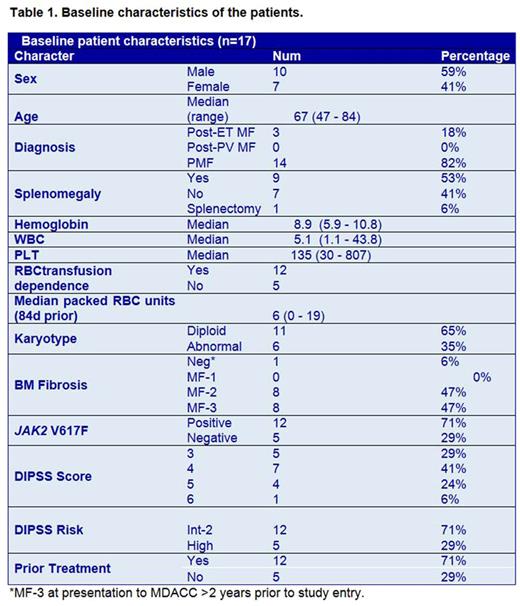Abstract
Introduction: Anemia is common in MPN-associated myelofibrosis (MF), and current therapies (e.g., erythropoiesis stimulating agents, androgens, danazol, immune modulatory drugs and corticosteroids) are unsatisfactory. Furthermore, anemia is not improved and initially worsened by ruxolitinib, an important MF therapy. New drugs with novel mechanisms of action are needed. Sotatercept is a first-in-class activin receptor type IIA (ActRIIA) ligand trap consisting of the extracellular domain of ActIIRA linked to the human IgG1 Fc domain. Sotatercept binds to and sequesters ligands of the transforming growth factor beta (TGF-ß) superfamily, thus relieving their blockade of terminal erythroid differentiation. Pre-clinically, sotatercept corrects ineffective erythropoiesis in ß-thalassemia (Dussiot, M. et al. Nat Med 2014) and its murine ortholog RAP-011 improves erythropoiesis in Diamond Blackfan anemia (Ear, J. et al. Blood 2015). Clinical trials in persons with lower risk myelodysplastic syndromes (Komrokji, R. et al. ASH 2014) and chemotherapy-induced anemia (Raftopoulos, H. et al. Support Care Cancer 2016) have shown promising results.
Methods: This is an ongoing phase-2 study of sotatercept, 0.75 or 1 mg/kg subcutaneously every 3 weeks (1 cycle), in subjects with MF, whether primary (PMF) or post-polycythemia vera/essential thrombocythemia (post-PV/ET MF). Subjects must be RBC-transfusion-dependent (Gale, R.P. et al. Leuk Res 2011), have hemoglobin <10 g/dL on every determination during the 84 days preceding study entry without RBC transfusions, or have hemoglobin <10 g/dL despite intermittent RBC transfusions without fulfilling the criteria for transfusion dependence. Primary endpoints include anemia response and safety. Secondary endpoints include time to and duration of anemia response. Anemia response is a composite of RBC-transfusion-independence and hemoglobin response (increase of ≥1.5 g/dL from baseline on every determination consecutively over ≥84 days without RBC transfusions). Subjects must have received ≥5 cycles of sotatercept to be evaluable for response.
Results: 18 subjects are enrolled to date. 1 subject received 6 cycles at a sub-therapeutic dose of 0.3 mg/kg and was not considered for efficacy evaluation, but was evaluable for safety. Of the remaining 17 subjects, 11 received 0.75 mg/kg and 6, 1 mg/kg. Median age was 67 years (range, 47-84 years); 10 were male and 7 female. 14 had PMF and 3, post-ET MF. 12 subjects had JAK2 V617F, 1 had MPLW515L and 2 had CALR exon 9 mutations. 1 subject was triple negative and 1 subject had no JAK2 or MPL mutation but was not tested for CALR mutations. All 17 subjects had intermediate-2 or high risk disease by the Dynamic International Prognostic Scoring System. Table 1 summarizes baseline variables for these 17 subjects. Median number of cycles of sotatercept received is 5 (range, 1-13).
14 of the 17 subjects received ≥5 cycles and were evaluable for response. The 3 other subjects received 1, 2 and 2 cycles and discontinued due to unrelated medical problems, hypertension and stem cell transplant (SCT), respectively. 5 of 14 (36%) evaluable subjects have responded; 4 of whom continue on study in ongoing response. All responders are female and all female subjects evaluable for response responded. Responses occurred across phenotypic driver mutation categories and in both transfusion-dependent (n=3) and -independent (n=2) subjects. 40% and 25% of evaluable patients responded in the 0.75 mg/kg and 1 mg/kg dose cohorts, respectively. Most adverse events (AEs) were grades 1 or 2. The only AEs possibly attributable to sotatercept include grade 3 hypertension leading to discontinuation, and grade 1 myalgia, bone pain, pain in extremity and injection site reaction. 5 subjects remain on study. 12 have discontinued because of no response (5), SCT (2), unrelated medical problems (1), hypertension (1), disease progression (1), transformation to AML (1) and withdrawal of consent (1).
Conclusion: Sotatercept improves anemia and RBC-transfusion-dependence in persons with MF and is well-tolerated. Enrollment to the trial is ongoing; updated results will be presented. A separate cohort of subjects receiving ruxolitinib has been added and will also be discussed. Based on the preponderance of responses at the 0.75 mg/kg dose, this dose has been selected for the combination cohort.
Daver:Incyte: Consultancy, Other: Advisory board, Research Funding. Jabbour:ARIAD: Consultancy, Research Funding; Pfizer: Consultancy, Research Funding; Novartis: Research Funding; BMS: Consultancy.
Author notes
Asterisk with author names denotes non-ASH members.


